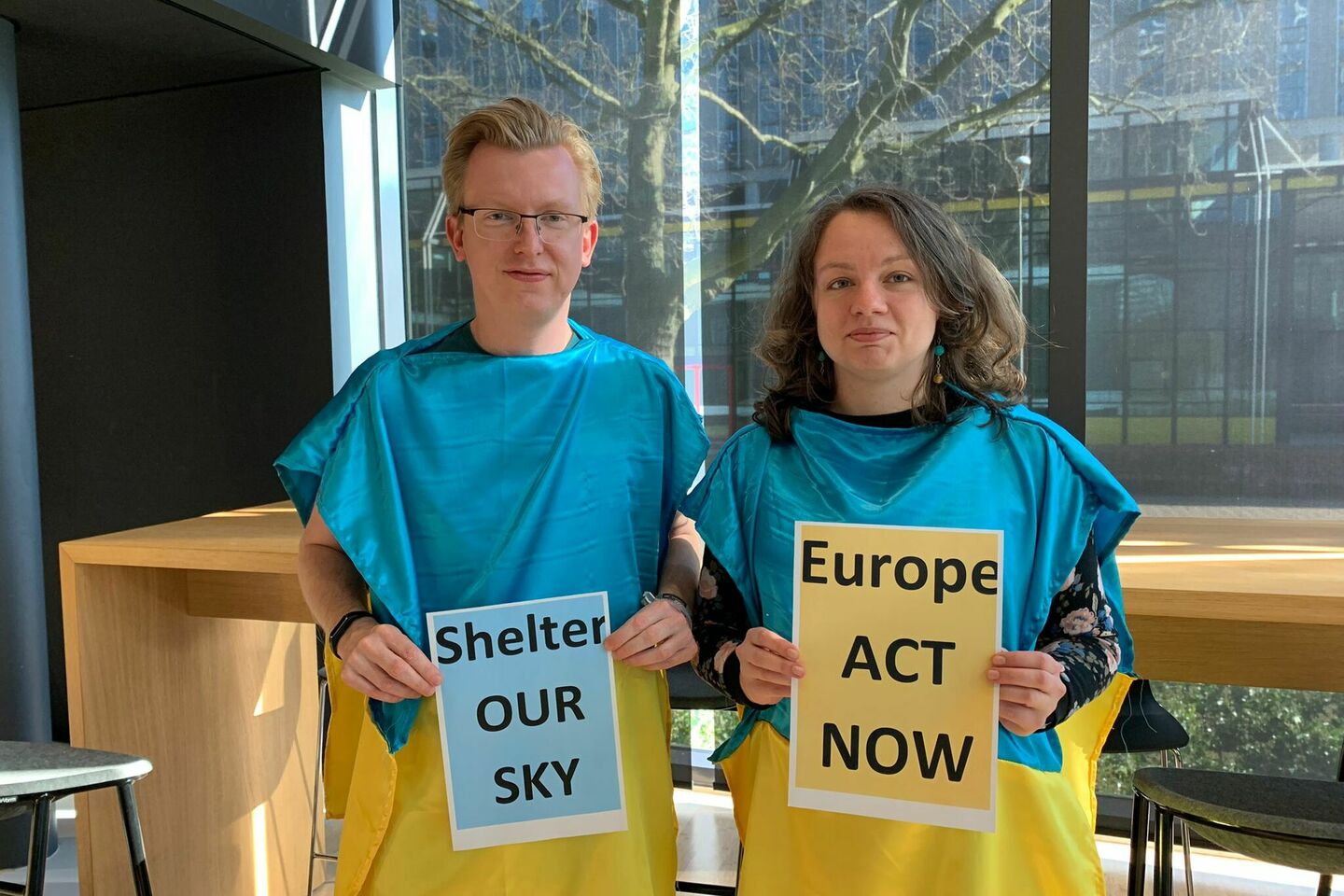
Ukraine: what’s next?
Four Ukrainians at TU/e share their visions
Ukrainians at TU/e certainly haven’t been idle over the past few days. They attended protests, are in close contact with their loved ones at home and try to arrange help where they can. The war is all people talk about anyway, Ukrainians and non-Ukrainians. But what’s next for Ukraine? Cursor spoke with PhD student Anastasiia Hraivoronska, postdoc Heorhii Humeniuk, full professor Mykola Pechenizkiy and associate professor Sveta Zinger.
Beep beep. 06:52 AM. It is the WhatsApp of associate professor Sveta Zinger. Daddy’s texting. "I'm okay, I’m calm." A ritual that has developed since the beginning of the war. “I wait every morning to hear that he is still alive. The first few days I cried so much that I could no longer see my screen.” Zinger, associate professor at the department of Electrical Engineering is from Dnipro in eastern Ukraine. “The Russians are advancing further and further. I'm afraid they'll get their hands on my hometown too. I visited Dnipro as recent as January. Now the airport doesn’t exist anymore, it is so surreal.”
Besides family in eastern Ukraine, Zinger also has family and friends in Russia with whom she is in regular contact. “I believe that the Russian people do not want this. Russians and Ukrainians have a long relationship, many families are mixed. My friends there apologize to me, but for what? They can't do anything. This is a war of one man: Vladimir Putin. There is no real conflict, I dare say. I read so much news, in five languages which allows me to see many sides. You have Putin and then of course the generals who follow his orders. The tribunal is waiting for them. It is better to stop now than start a nuclear war,” Zinger says emotionally. “We are open to work together and live next to each other. A lot is possible. But right now our people are paying with blood for freedoms that are normal here. This is a tragedy. There are many people who will never see their relatives again. The guys who go into the army there are younger than many of the students I teach here. That's really awful. We need peace right now.”
Mixed families
Professor of Mathematics and Computer Science Mykola Pechenizkiy is from the highly affected Charkov (also Kharkiv, ed.) where he also still has many friends and relatives of all ages. “I can hear the bombing when I call them.” He is married to a Russian woman and therefore has a mixed family. “We are blessed not to have disagreements about this in our family, I know many who do or had, especially in 2014.” Pechenizkiy is pointing back to the start of the war. “This war hasn’t started last week, but eight years ago with the annexation of Crimea in 2014 and the war in Donetsk and Luhansk. Back then, many Russians would still support Putin and his actions there and the rest of the world barely even noticed what was happening. Now you see a shift. But this was allowed to develop for years into what it is now.”
Pechenizkiy: “There is a lot of propaganda in Russia affecting people’s minds. For others like my wife who have been away from Russia for a long time, this luckily is different. I don’t know how many in Russia know what is really going on or how many are against the war. It’s hard to judge. What I have seen is that only hundreds and thousands went to protest on the streets, not millions. It is clear that many more Russian inside Russia are against the war, but are afraid of acting. It is human to overestimate the risk of an action and severely underestimate consequences of inaction. Anyhow, in the beginning I had hope that if millions would go on the streets of Moscow in chaotic protest, Putin could maybe be brought down. But since this didn’t happen in the first few days after the invasion, I’m afraid it won’t happen anymore.”
This war hasn’t started last week, but eight years ago with the annexation of Crimea in 2014 and the war in Donetsk and Luhansk
Action
Anastasiia Hraivoronska has almost completed her PhD trajectory at TU/e’s department of Mathematics and Computer Science, but she took some time off in order to fully focus on her family, friends and on the protests. She immediately decided to attend the protest in The Hague on 24 February and she has since attended several other protests, including the large protest on Amsterdam’s Dam square on 27 February and another protest in The Hague on 28 February. She and her partner Lennard Boer, who is very supportive of her, do everything they can to make people aware of what is going on and to organize support for Ukraine.
“I have many friends who are still in Kyiv, which is where I’m from originally,” she says. “I worry about them, and about my parents. They too are still in Ukraine, but they have fled to the country’s western border. I still talked to them yesterday (Sunday, ed.). They were making Molotov cocktails to defend the country, as the Ukrainian government encouraged its citizens to do.”
Her friends try to seek refuge in bomb shelters, “but there are numerous people who don’t have shelters like that. They need to stay inside their homes and sleep as far away from the windows as possible.” Hraivoronska follows the news all day, she says, which is apparent from the fact that she regularly checks her telephone during the conversation. “You don’t really want to watch the news all the time, that’s unhealthy, but you also want to stay informed. I have a dual feeling about it. I’m so very proud of my friends over there. They are calm and strong when I call them, I admire them for that.”
Danger of disinformation
Heorhii Humeniuk, postdoc at the department of Chemical Engineering and Chemistry, still has family in Ukraine and Belarus. “I’m from Kyiv originally, and my mother, grandmother and friends still live there. My father and stepmother live in Belarus.” Because of this, he hears the news both from the Ukrainian and the Belarusian perspective. “The media in Russia and Belarus are severely censored, which is why people don’t hear the whole story. My father is aware of this, but many people aren’t. The crazy thing is that Putin appears on television and claims that he invaded Ukraine to protect pro-Russian minorities in eastern Ukraine. But he attacked us from three sides, including from Belarus. That story is wrong, obviously. He also says that our president and our people are Nazis and drug addicts. These are all lies that people hear in their living rooms via social media.”
Hraivoronska and Boer both say that disinformation is starting to pose a genuine threat. They see, for example, how false information about evacuations that haven’t taken place is being shared via social media to create a panic. “The Russians are responsible for that. They also try to get information about roads by making up false stories. They use Telegram groups to ask what roads are most accessible and quiet to transport a sick child or elderly person. And fake donation hubs have also been identified.”
Hraivoronska has some ideas about what should be done to stop this war situation. “The first thing we need to do is to make sure that everyone gets the right information, so that people know what’s really going on and won’t get duped by Russian propaganda. Second, we need European sanctions against Russia. At the individual level, people can help with donations and humanitarian aid.” Hraivoronska has a few reliable suggestions for that:
- Suggestions for foreigners who want to help Ukraine
- Send humanitarian and medical aid to a warehouse in Poland
- Donate to various projects that are directly involved with the army and humanitarian charity organization in Ukraine
- Donate to the foundation ‘Ukrainians in the Netherlands’
Safe country
Strangely enough, Ukraine is still on the Dutch government’s list of safe countries. “That has to change,” Hraivoronska and Boer believe, because the country is anything but safe. “We are being attacked from three sides. The help from Belarus allowed the Russians to quickly move close to Kyiv.” Russia’s threat to use nuclear weapons leads to extra concerns. “Naturally, we hope that this won’t happen,” Hraivoronska says. “Russia has long-range missiles that can easily reach western Europe, but it also has short-range missiles that can be dropped from an airplane. But there’s a good chance that the latter category of missiles can be intercepted, since these airplanes are slow and easy to spot.”
Not a matter of winning
When asked whether he has a solution that will put an end to this war, Humeniuk says that he has faith in his compatriots that serve in the army. “They show bravery to fight to the end.” Nevertheless, he fears that a war against Russia ultimately can’t be won. “Russia has a sheer limitless number of weapons and military personnel, more than most countries. But I don’t really want to talk about winning. We are defending our country; it isn’t even a matter of winning anyone. This is an invasion and we are just trying to protect ourselves.”
How to solve this invasion, Pechenizkiy is not fully sure. “NATO could intervene, but they don’t. I understand that NATO and the EU want to stay away, but at the same time it’s hard to stay away. What Russia does, bombing civilians goes beyond anything reasonable. It is a war crime. If NATO doesn’t want to intervene with an army, then please just give us some weapons of air defense to protect the sky. Even if it’s old equipment. At the moment, civilians are dying from rockets that can fly through an unprotected sky. Many more will be dying.”
“I think that there are two ways to stop this invasion”, Humeniuk says. “Either a solution from within Putin’s inner circle, or there will come a solution from within the EU or the UN. Simply removing Putin isn’t the solution. He is surrounded by a large mafia-like organization. When you remove him, the next leaders will be ready to take over. It is really necessary to change the system from the very early beginning both in political and economic branches.”
Foresight
When asked how this invasion should be resolved, Sveta Zinger becomes silent. After much thought: “Deposing Putin is not going to work. I think the solution must come from Putin's inner circle. If they stop following his orders, that could be the solution. But they will be fearful.” In addition, Zinger cites Garry Kasparov and his ideas to resolve this invasion. “Kasparov saw it all coming. He predicted a third world war and the invasion of Ukraine. His solution is for NATO to signal to Russia that they are ready to fight, just as Putin signals that ‘we in the West will face consequences of the sanctions we took against Russia’. His opinion is also that talking with Putin won’t help us further.”
Humeniuk: “Every war ends eventually, history teaches us that. I hope for the respectful peace we so much deserve after facing this inappropriate aggression lasting eight years already. I wonder where Russia will draw the line: will they stop after a certain number of soldiers have died? But what frightens me so in this conflict is Putin’s threat of using nuclear weapons. He has them standing ready, missiles, airplanes and submarines. Russia is such a vast country, those weapons can reach the entire world.”
Support
“Our president Volodymyr Zelenski is a man of honor,” Humeniuk says. This became clear to Humeniuk when the United States offered to evacuate him (Zelenski, ed.). “He said no, I don’t want to give away my city and country. People often say that he is too inexperienced, but he is completely devoted to protecting his country.” Humeniuk shares big gratitude for support of his country and people and thinks that international support for the Ukrainian army is very important. “And #prayforukraine, I don’t know what else to do.”
“I’m grateful for the support we get from the whole country and beyond,” Pechenizkiy says. “If you go to the store you see empty shelves of diapers and medication because they were all bought and sent to Ukraine. But what I miss at the moment from the Netherlands but also the free world as a whole, is to see the bigger picture. We’re fighting for freedom, core values. Ukraine’s fight symbolizes the fight of us all to keep those rights and values up. This is not an attack on Ukraine, but on Europe and the free world. Yes, I feel that my country is under attack, but I also feel attacked as a European.”
History repeats
With this war, Zinger thinks of a quote by a well-known Russian writer Leo Tolstoy that she would like to share with the world:
“Again war. Again sufferings, necessary to nobody, utterly uncalled for; again fraud, again the universal stupefaction, and brutalization of men. … What can this be? Is it a dream or a reality? Something is taking place which should not, cannot be; one longs to believe that it is a dream and to awake from it. But no, it's not a dream, it's a dreadful reality!"
Leo Tolstoy, 1904

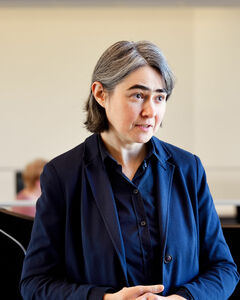
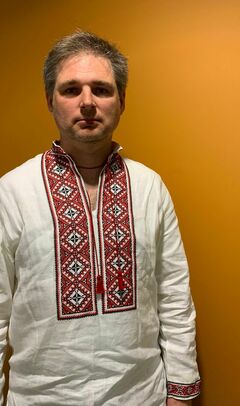
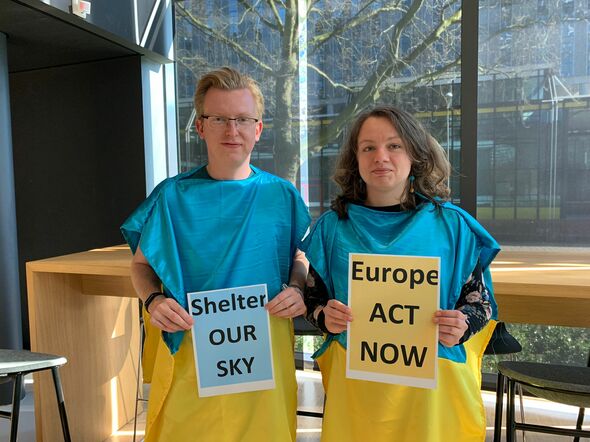
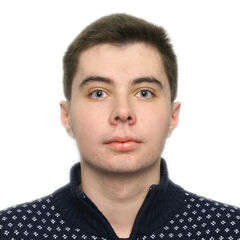
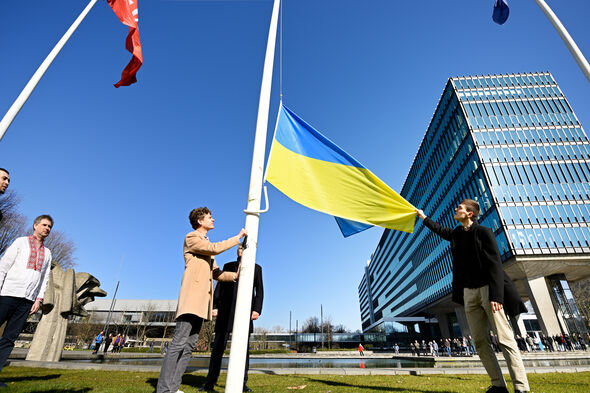
Discussion